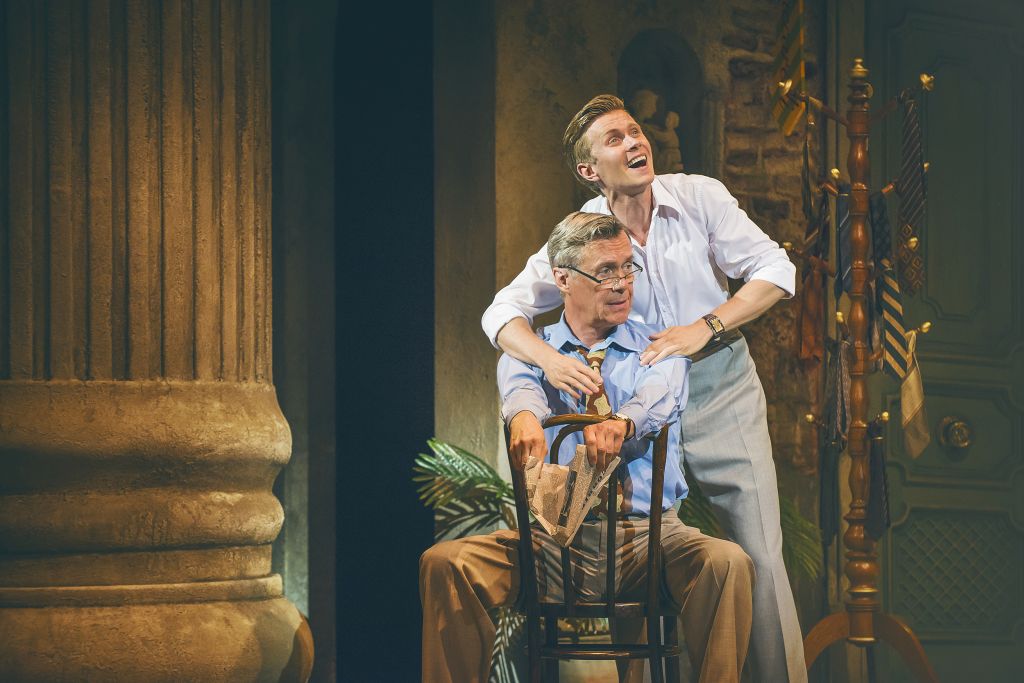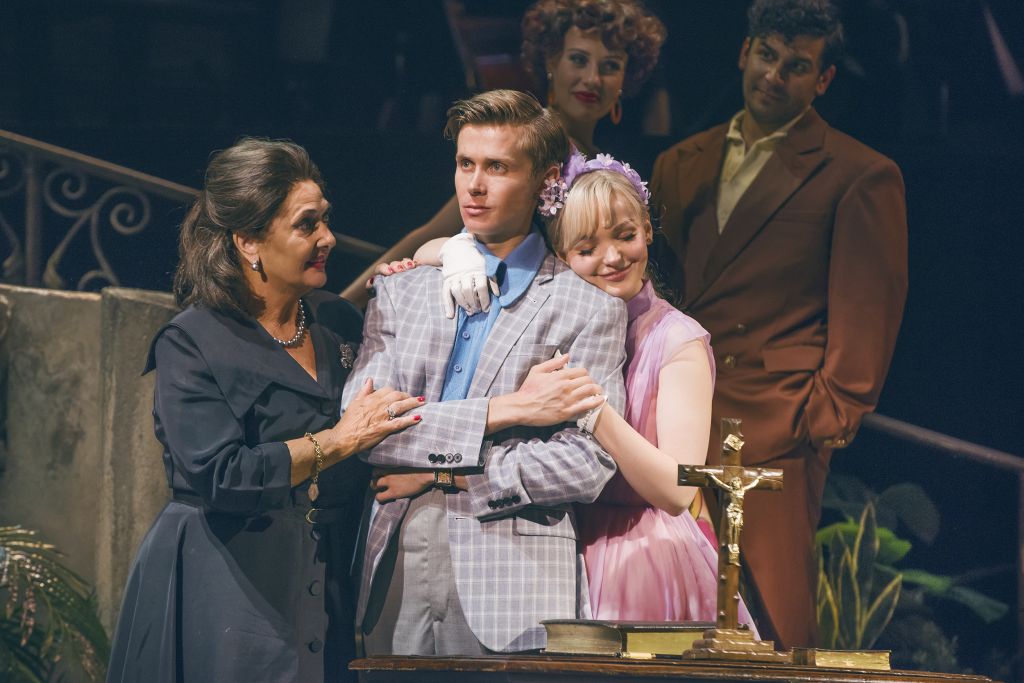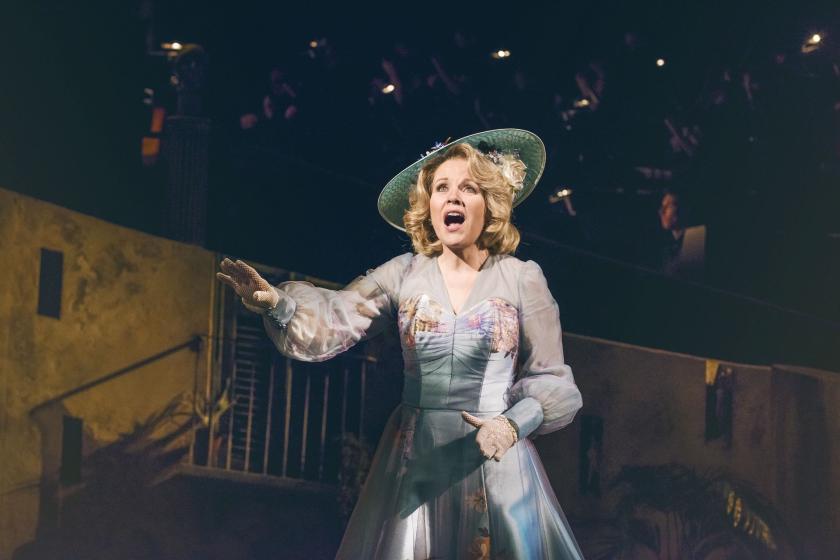A Broadway show as melodically haunting and sophisticated as it is niche, The Light in the Piazza has taken its own bittersweet time getting to London. A separate European premiere in 2009 at Leicester's Curve Theatre whetted the local appetite for a show that won six Tony Awards in 2005 but is far from standard musical fare. And here it finally is in the capital, albeit for 20 performances only in a full production, directed by Daniel Evans within the unexpected confines of the Royal Festival Hall.
Chief among those is surely Renée Fleming, the opera legend who has extended her repertoire in recent years towards plays and musicals, both on Broadway and off. (She and Ben Whishaw recently headlined the gnomic Norma Jeane Baker of Troy, the Anne Carson performance piece that in April opened New York's costly Shed Theatre.) And she proves a fine fit for this musical's rewarding star part of Margaret Johnson, a Southerner embarked with her daughter Clara (the Disney tween icon Dove Cameron, in a winning performance) on a holiday to Italy that changes both women's lives. The material has as its source a 1960 novella by Elizabeth Spencer, itself the basis for a 1962 film of the same name, with Olivia de Havilland as Margaret. Craig Lucas's fitfully successful book takes some while to get to the tension at its core: the damage done to Clara when she was kicked in the head by a pony age 12, which has resulted in a 26-year-old child-woman who is physically but not emotionally mature. Small wonder, therefore, that Margaret isn't best pleased when a chance Florentine gust of wind all but blows her daughter into the embrace of Fabrizio (Rob Houchen, in a breakout performance), whose father (Alex Jennings, pictured above with Houchen) later turns out to have possible designs of his own on Clara's protective mum. A further rub: the smitten Fabrizio is – gasp! – six years younger than his inamorata. The age gap doesn't sit well with a fractious Italian family that might be better advised to tend to the adultery within their ranks. (Some of the stereotyping is pretty silly, not least when they all clap at Margaret's successful delivery of the none-too-tortuous words, "è vero".)
Craig Lucas's fitfully successful book takes some while to get to the tension at its core: the damage done to Clara when she was kicked in the head by a pony age 12, which has resulted in a 26-year-old child-woman who is physically but not emotionally mature. Small wonder, therefore, that Margaret isn't best pleased when a chance Florentine gust of wind all but blows her daughter into the embrace of Fabrizio (Rob Houchen, in a breakout performance), whose father (Alex Jennings, pictured above with Houchen) later turns out to have possible designs of his own on Clara's protective mum. A further rub: the smitten Fabrizio is – gasp! – six years younger than his inamorata. The age gap doesn't sit well with a fractious Italian family that might be better advised to tend to the adultery within their ranks. (Some of the stereotyping is pretty silly, not least when they all clap at Margaret's successful delivery of the none-too-tortuous words, "è vero".)
The Naccarellis, in one of this musical's bolder moves, chatter away among themselves in Italian that goes untranslated, or at least until such time in the second act as la mamma (Marie McClaughlin, pictured below left with Houchen and Cameron) breaks the fourth wall to explain what's going on: quite why no one does that any earlier isn't apparent, though the arc of the narrative itself is never in doubt. The result allows Fabrizio to let rip with a solo early on, "Il Mondo Era Vuoto", in which Houchen's tenor pours forth with Pucciniesque abandon. Jennings, in turn, gets a decisive (English-language) duet, "Let's Walk", with Margaret, and one has to assume that even an actor possessed of a CV such as his would never have thought he would one day be singing alongside Renée Fleming.  Fleming gets the two most vaunted numbers of a score here played by the Orchestra of Opera North, whose 40-strong presence gives Guettel's lush, strings-heavy sound an amplitude unavailable these days to most Broadway pits. And more than ever on this hearing, Guettel's career-defining contribution put me in mind less of his grandfather, Richard Rodgers (who is paid due homage in a lyric referencing a "children's carousel"), and more of the Stephen Sondheim who gave us Passion: another Italian-set story of difficult love told via a compelling musical weave that, as here, forsakes up-tempo musical earworms for a dissonant, minor-key landscape. The tonal fissures feel appropriate for a piece that treads both warily and open-throatedly around matters of the heart before coming to rest with Margaret's advice to "love if you can" – Clara's unbridled passions at odds with her own loveless marriage to the stay-at-home Roy (Malcolm Sinclair, like Jennings cast deliciously against type).
Fleming gets the two most vaunted numbers of a score here played by the Orchestra of Opera North, whose 40-strong presence gives Guettel's lush, strings-heavy sound an amplitude unavailable these days to most Broadway pits. And more than ever on this hearing, Guettel's career-defining contribution put me in mind less of his grandfather, Richard Rodgers (who is paid due homage in a lyric referencing a "children's carousel"), and more of the Stephen Sondheim who gave us Passion: another Italian-set story of difficult love told via a compelling musical weave that, as here, forsakes up-tempo musical earworms for a dissonant, minor-key landscape. The tonal fissures feel appropriate for a piece that treads both warily and open-throatedly around matters of the heart before coming to rest with Margaret's advice to "love if you can" – Clara's unbridled passions at odds with her own loveless marriage to the stay-at-home Roy (Malcolm Sinclair, like Jennings cast deliciously against type).
Margaret's revelatory numbers arrive one in each act and are put across with the expected technique coupled with genuine profondeur by Fleming, whose Broadway album includes Piazza's climactic, rending "Fable". Lucas's book once again seems unsure just how much narration to give to Margaret, who on occasion steps out of proceedings so as to clue us in. But Fleming, as did the role's fabled originator Victoria Clark, rides such infelicities with surpassing grace, whether expressing concern over a daughter all but done in by the naked statuary on view on Robert Jones's curved set or setting her daughter's impetuousity of feeling against the absence of any such quality in her own life. Wedding bells may toll but even as one partnership is achieved, another must be severed: Margaret in awakening her soul realises that she is at the same time saying goodbye to her daughter.
- The Light in the Piazza at the Royal Festival Hall to 5 July
- Read more theatre reviews on theartsdesk















Add comment